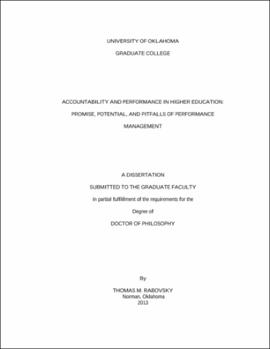| dc.contributor.advisor | Fryar, Alisa H | |
| dc.creator | Rabovsky, Thomas Morgan | |
| dc.date.accessioned | 2019-06-03T20:35:31Z | |
| dc.date.available | 2019-06-03T20:35:31Z | |
| dc.date.issued | 2013 | |
| dc.identifier | 99172192702042 | |
| dc.identifier.uri | https://hdl.handle.net/11244/320214 | |
| dc.description.abstract | In recent years, performance based accountability regimes have become increasingly prevalent throughout government. This dissertation explores the role of performance data in higher education policymaking, both in terms of external accountability and oversight, and in terms of internal management. At the center of this discussion are debates about the proper role of quantifiable data about institutional performance and the appropriateness of various approaches for measuring and tracking student success. As tuition rates have skyrocketed and the American economy has faced increased pressure from the international arena, American universities have struggled to satisfy demands for improved performance. Policymakers have responded to these concerns by pursuing a range of policies aimed at increased accountability and a heightened emphasis on organizational performance, particularly with respect to budgeting. Similarly, many organizations have employed their own voluntary systems to track various metrics of performance as a tool to enhance internal management and improve student outcomes. | |
| dc.description.abstract | But despite the widespread these popularity of accountability policies, and the increased availability of quantitative performance data, there remain substantial questions about the extent to which these reforms have been successfully integrated into policymaking and implementation. This dissertation draws on data collected from publicly available datasets (IPEDS), in combination with a survey of presidents at public colleges and universities, to assess the impacts of performance funding and performance management in higher education. In doing so, it makes important contributions to literatures on performance management as well as political control and bureaucratic values. | |
| dc.description.abstract | Chapter III focuses on performance regimes and their impacts on agency budgets, while Chapter IV centers on issues related to the role of performance information in inter-institutional policymaking. Chapter V examines the factors related to the use of performance management strategies for internal management functions. Overall, the findings suggest that performance funding policies have generally been ineffective and that they have often become highly politicized and ideologically driven. Particular emphasis is placed on thinking about the causal logic of performance based accountability, as well as the role of bureaucratic values and organizational capacity in shaping the effectiveness of these reforms. | |
| dc.format.extent | 184 pages | |
| dc.format.medium | application.pdf | |
| dc.language | en_US | |
| dc.relation.requires | Adobe Acrobat Reader | |
| dc.subject | Education, Higher--United States--Evaluation | |
| dc.subject | Educational accountability--United States | |
| dc.subject | Universities and colleges--United States--Administration | |
| dc.title | ACCOUNTABILITY AND PERFORMANCE IN HIGHER EDUCATION: PROMISE, POTENTIAL, AND PITFALLS OF PERFORMANCE MANAGEMENT | |
| dc.type | text | |
| dc.type | document | |
| dc.thesis.degree | Ph.D. | |
| ou.group | College of Arts and Sciences::Department of Political Science | |
